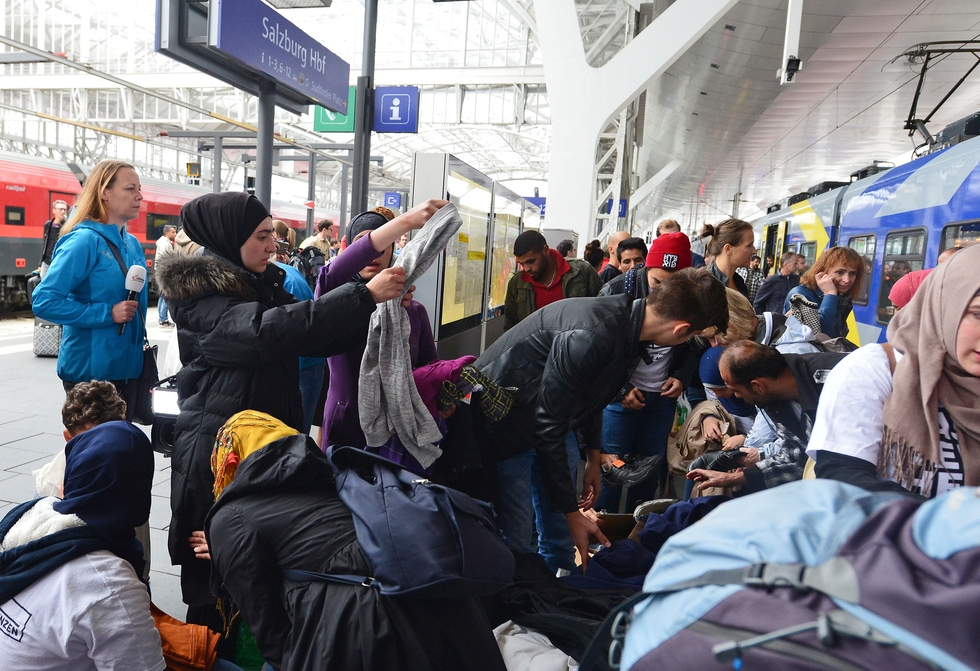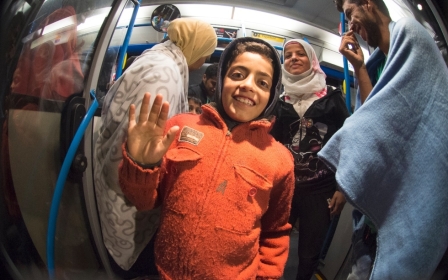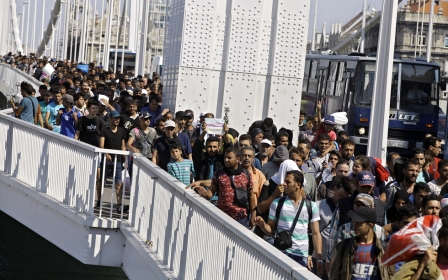Refugee crisis rocks Hungarian capital

BUDAPEST - On the steps of the Budapest’s grand Keleti railway station, the latest flash point of Europe’s unfolding refugee crisis is taking place. The bustling European transport hub has been transformed into a makeshift refugee camp as around 3,000 migrants are blocked from continuing across Europe by the Hungarian authorities. Meanwhile in the major European capitals, ministers scramble to find solutions to a complex and seemingly open-ended problem.
On the steps of the station constant protests of a few hundred people are held, calling for freedom and protection for the refugees. Below the station steps, in a subterranean courtyard that leads into the metro, thousands have laid out bedding and tents. A standpipe in the centre of the courtyard runs constantly as men and women wash cloths and themselves. Only two public toilets and a dozen porter loos are available, creating long queues. With no planning and little provision of services, a feted stench has taken hold as the accumulated waste of thousands of people – many of them families with small children – bakes in the sun.
Around 70 percent of the refugees are Syrian and Iraqi fleeing the so-called Islamic State militants or the brutality of the Assad Regime in Syria; there are a number of Afghan as well as north and central African migrants. “The situation here [in Budapest] is terrible. They're not letting us pass. We carried everything by hand for nothing,” Qusay, a Syrian man in his early 20s told MEE on the steps of Keleti station. “We just want to go somewhere safe, with no war. We just want a peaceful country that stands with the Syrian people.”
With around 4,000 refugees crossing the Greek-Macedonian border every day, the German authorities believe that about 14,000 migrants are traversing though Europe. Despite the large razor wire fence that now spans the Hungarian-Serbian border, the numbers appear to only be increasing. As thousands poured into the Hungarian capital, authorities took the decision to cancel all international trains. This decision created a chaotic scene. Many refugees tried to board the international services to Germany and Austria but with trains cancelled, a bottleneck has arisen in Budapest as more migrants arrive but few have found routes to leave.
With international services suspended and Austrian authorities increasingly on the look out for human traffickers - following the death of 71 people in a truck abandoned on the Austrian motorway last week - refugees are stuck. On Friday, around 1,200 refugees took the decision to start walking the 177km towards the Austrian border. The next day, another 1,000 also started to make the journey by foot. But the closure represents something significant for the European Union as well — free movement, the bedrock of European integration, has broken down as borders closed for the fist time in years.
Shockwaves
There are fundamental shockwaves pulsing through an already weakened and fragile European system, which has struggled with huge political and economic crises in recent years.
German authorities have announced that they will give asylum to thousands of Syrian refugees on arrival in the country. Authorities say they are preparing tents, former army barracks, two hangers of the Berlin’s, now closed, Tempelhof Airport and many flats to accommodate arrivals. Overnight on Friday, several buses were sent to collect some of those walking towards the border and also some from Keleti station, after German and Austrian governments agreed to receive them. There are also trains being scheduled to move people from the Hungarian border into Vienna.
However, Hungary is insisting on enforcing current EU regulations on migration, saying arrivals in Hungary must apply asylum in the first country of arrival. This is despite many experts and European foreign ministers saying that the Dublin Treaty – which manages how migrants should be processed – is “broken” and needs reform.
This move on the part of the Hungarian authorities is worrying many migrants who are aware that this county has a very high rate of rejection for asylum, which clashes strongly with its neighbors preparations to welcome Syrians. Meanwhile Viktor Orbán, the country’s prime minister, who arrived in Brussels for a meeting of country leaders of the crisis, is defending his hardline policy towards the refugees saying that he was “defending European Christianity against a Muslim influx”, The Guardian newspaper reported.
While Austria and Germany have agreed to take a larger share of refugees, and have started to receive them, other EU nations have also increased their commitment following a huge increase in public support for the migrants. The UK Prime Minister David Cameron made a statement that they would take “thousands” of refugees. However with the UK’s previous commitments to take Syrian refugees taking years to implement and only accepting a handful of people, how this will be implemented is yet to be seen.
Hisham, 28 from Baghdad, is trying to get to Belgium where he has many friends. He told Middle East Eye: “We just want to keep going, the government doesn’t want us here, but they won’t let us go either, why?”
New MEE newsletter: Jerusalem Dispatch
Sign up to get the latest insights and analysis on Israel-Palestine, alongside Turkey Unpacked and other MEE newsletters
Middle East Eye delivers independent and unrivalled coverage and analysis of the Middle East, North Africa and beyond. To learn more about republishing this content and the associated fees, please fill out this form. More about MEE can be found here.



